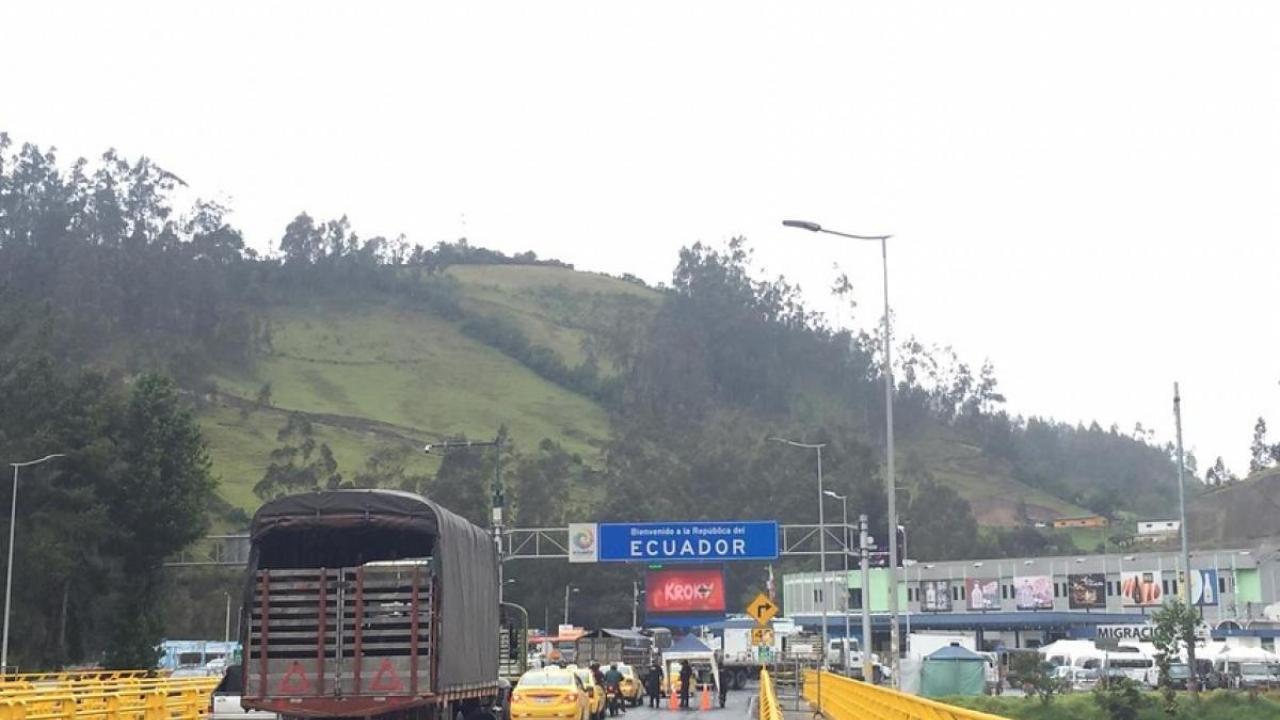
The authorities of Carchi, a border province of Ecuador, are calling for the creation of a humanitarian corridor to facilitate the passage of perishable export products.
The daily losses caused by the closure of the Rumichaca international bridge, located on the border between Ecuador and Colombia, are estimated at US$ 1.9 million, economic analysts say.
Óscar Ruano, head of the Ministry of Production, Foreign Trade, Investment and Fisheries of Ecuador, in Zone 1, explains that the most affected items are exports and imports, which are currently suspended.
Ruano, former governor of the Ecuadorian province of Carchi, explains that every day his country loses US$700,000 in exports and US$1,200,000 in imports.
He adds that related activities, such as international cargo transportation, public transportation service, currency exchange, hotels, restaurants, among others, are beginning to feel the ravages of the blockade.
Traders from the Tulcán warehouses that sell products such as sardine, tuna, rice, sugar, oil, eggs, soft drinks, which are transported to various Colombian border towns, complain that the 200 vehicles that load these foods cannot cross the border. towards Ecuadorian territory.
Several shipments of shrimp, bananas, coffee, mango, avocado, onion and others, destined for Colombia, are dammed in Tulcán.
While tractors with cleaning supplies, vehicle parts, and raw materials for the Ecuadorian industry cannot leave Ipiales for Tulcán.
Until the night of this Tuesday, July 2, there is no further progress in the negotiations between motorists and the Government of Colombia.
Édison Mena, president of the Colombian Truckers Association, Ipiales section, points out that the measure is indefinite until President Gustavo Petro addresses their demands.
“We disagree with the activation of a second toll on the Ipiales-Pasto highway and vice versa, since two sections remain to be delivered,” he indicates.
The leader adds that they disagree with the direct passage of goods and highlights that loading and unloading in Tulcán and Ipiales generates resources and leaves money in both cities.
He also complains about the constant strikes that take place in Cauca. So far in 2024 there are already 50, affecting cargo and passenger transport.
On the night of Monday the 1st and the morning of Tuesday the 2nd of this month, 25 buses with Colombian passengers and two units with Ecuadorian travelers who were stranded in Ipiales were allowed to enter from Ecuador.
Lucía Pozo, governor of Carchi, began talks this Tuesday afternoon with the representatives of the heavy transportation union, Ipiales section, with the aim of allowing the passage of 52 Ecuadorian tractor-trailers that remain on both sides of the border, with perishable cargo, which runs the risk of being damaged.
The idea is to create a humanitarian corridor to enable the crossing of automobiles in exceptional cases. Sick people from both countries have had to go through the binational crossing, even in wheelchairs, since they had to be treated in Tulcán or Ipiales.
Pozo indicated that it is about coordinating actions in the foreign ministries and presidencies of both countries in order to establish a dialogue to establish the mechanisms that enable the passage of cargo carriers and tourists.
The owners of 52 trucks are demanding to pass to Colombia, since the products they are transporting run the risk of being damaged. There are 22 trucks with Ecuadorian bananas, 10 with tuna and sardines and 20 with non-perishable merchandise.
The president of the ACC Ipiales, Édison Mena, confirmed that they will raise the request to senior managers to meet the demand of the Ecuadorian authorities. Pedestrian circulation to and from Ecuador is normal.
In Ipiales, the sale of fuel was restricted tonight at all stations, applying the Pico y Placa system, with the marketing of minimum values at the service of public transportation. Amílcar Pantoja, mayor of Ipiales, commented that there are tankers stranded in the Chachagüi sector.
On the other hand, in Tulcán control operations were activated at the pumps to prevent smuggling from taking off. Mayor Pantoja is concerned because the informal crossings that connect Ipiales with Tulcán and vice versa have been reactivated, so he announced that Ecuadorians would be being assaulted and robbed on those roads.
Last night, the municipal authority led control operations on these roads, providing accompaniment with the Colombian Police to caravans of Ecuadorian motor vehicles seeking to leave Colombia or Colombians entering from Ecuador through these border crossings.
The authority recommends not traveling at night but during the day, because these sectors have become dangerous in recent hours. In Carchi, the commanders of the law enforcement forces held a meeting in the Governor's Office to strengthen security strategies on the border.









